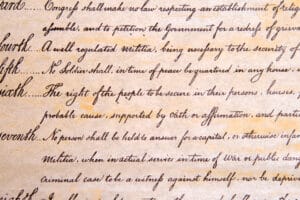You hear the term on prime time television shows such as Law & Order and Chicago PD, yet few of our clients understand the legal implications of probable cause. What is the meaning a “probable cause,” and how is the legal term applied in criminal cases?
Overview of Probable Cause
Probable cause is the requirement followed by law enforcement agencies when it comes to arrests, searches, and seizures. The legal requirement of probable cause is mentioned in the Fourth Amendment to the United States Constitution.
“The right of the people to be secure in their persons, houses, papers, and effects, against unreasonable searches and seizures, shall not be violated, and no Warrants shall issue, but upon probable cause, supported by Oath or affirmation, and particularly describing the place to be searched, and the persons or things to be searched.”
For a court to issue a warrant to a law enforcement agency, the Fourth Amendment clearly states that there must be probable cause to issue the warrant.
Probable Cause vs. Reasonable Suspicion
The answer to the meaning of what is the meaning of probable cause can be written in one sentence: A reasonable person believes a crime is about to be committed, is currently being committed, or has already been committed. Probable cause not only is enough to issue a warrant, but it is also enough for a law enforcement officer to make an arrest if he or she sees a crime committed.
The Supreme Court has ruled on the meaning of reasonable suspicion in the following way: “The sort of common-sense conclusion about human behavior upon which practical people . . . are entitled to rely.” If a law enforcement officer has “reasonable suspicion,” the officer can frisk and/or detain a suspect. However, reasonable suspicion does not permit a law enforcement officer to search private property unless the suspect is detained on school grounds.
How Probable Cause Applies to Arrests
A probable cause for an arrest means a law enforcement officer believes a suspect is committing, has committed, or is about to commit a crime. The law enforcement officer must base the probable cause decision on facts and circumstances, not on suspicion or intuition. Detaining a suspect does not require the legal test of probable cause. Instead, an officer can detain a suspect because of reasonable suspicion.
How Probable Causes Applies to Searches
Applying the probable cause test to searches starts with an officer using the facts and circumstances surrounding a crime to determine there is evidence of a crime at a specific location. Law enforcement must obtain a search warrant issued by a judge who agrees law enforcement has met the probable cause test.
There are instances when law enforcement does not need to acquire a search warrant to conduct a search:
- When the person responsible for making decisions about a location gives consent
- When conducting a search after a legal arrest
- When an emergency arises that jeopardizes public safety
How Probable Cause Applies to Seizures
When a law enforcement officer knows about the facts and circumstances concerning the location of stolen items, the officer has probable cause to seize the alleged stolen property. A search warrant to seize private property lists the items that law enforcement can legally seize. Any items not mentioned in the warrant are considered off-limits for law enforcement.
Contact a Criminal Defense Attorney
Probable cause often comes up in a criminal trial because the defense attorney for the defendant wants to ensure law enforcement followed all the guidelines required to obtain an arrest, search, and/or a seizure warrant. If you face a criminal charge that involves the use of a warrant you should contact a California -licensed criminal defense attorney to review your case.
Call one of our seven offices or submit the short online form to get started on your case today.





